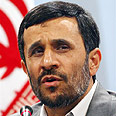

"The era of hunting down old Nazis is over, but that's not to say that such operations are completely a thing of the past, and it could very well be that a leader such as Iranian President Mahmoud Ahmadinejad suddenly finds himself before the International Criminal Court in The Hague," former Mossad operative Rafi Eitan told German weekly Der Spiegel.
In the interview, published Monday, the current Israeli Minister of Pensioner Affairs said "Those who spread poison and want to eradicate another people has to expect such consequences."
Eitan went on to explain why Mossad didn’t apprehend Josef Mengele during the 1960 capture of Holocaust architect Adolf Eichmann in Buenos Aires despite learning that the notorious concentration camp "doctor" was also in the Argentinean capital.
"There were just 11 of us and we had our hands full dealing with Eichmann. After we had brought Eichmann to the house where we kept him until we flew him out, my boss at the Mossad, Isser Harel, called. He wanted us to arrest Mengele as well, but Mengele had left his home in the mean time," the minister recalled.
"Harel said we should wait until he returned and then bring both he and Eichmann to Israel in the same plane. I refused because I didn't want to endanger the success of the Eichmann operation."
'It wasn't about revenge'
Eitan told the German weekly there was no discussion about which of the two were more important - Mengele, the "Angel of Death" from Auschwitz, or Eichmann, who administered the deportation and murder of millions of Jews.
"In 1958, we resolved to capture a former Nazi and bring him to justice in Israel. Possible targets included Mengele, Eichmann, the former head of the Gestapo Heinrich Müller, and Hitler's right-hand man Martin Bormann. The first one we could find was Eichmann, so we concentrated on him," he said.
"We wanted to keep Eichmann's extradition to Israel secret and then return to Buenos Aires to capture Mengele. But due to a leak, Prime Minister David Ben-Gurion had to make an official announcement about our success. When our agents returned to Argentina, Mengele had moved out of his apartment and gone underground.
Asked whether Mossad was able to pick up Mengele's trail again before his death from a stroke in 1979, Eitan said "We were able to find him one other time, but we were not able to organize an operation to capture him.
"We could have killed him with a sharpshooter, but we didn't want to. It wasn't about revenge," he said.















